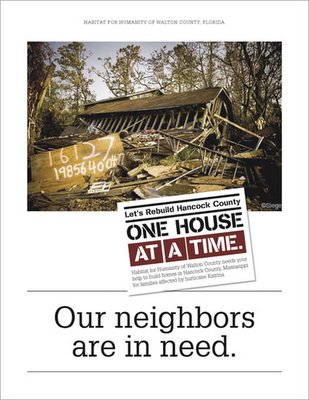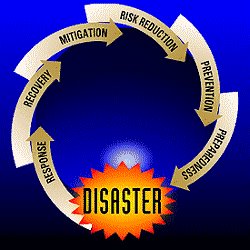Carnival of Hurricane Relief
This season brought 26 named storms, compared to 11 in an average year. And, this season, 13 storms became hurricanes, compared to the seven hurricanes seen in an average season.
Perhaps most ominous, Katrina, Rita and Wilma were three of the six strongest hurricanes on record.
It has been four months since Instapundit joined with NZ Bear announcing Hurricane Relief Blog Day: 9/1/05, an idea suggested by Hugh Hewitt. The quick response by bloggers was remarkable.
Continuing to focus on the need for relief, and documenting the response and recovery,Carnival of Hurricane Relief presents weekly updates from the blogs as an antidote to hurricane relief fatigue.

Rebuilding Hope and Habitat
Operation Eden, an inspirational photoblog, is a personal chronicle of what Hurricane Katrina has done to these poor proud people.
I've donated my photographs to Habitat For Humanity to use in money-raising efforts to aid Hancock County, Mississippi, where my mom's little town of Pearlington is. There was no established Habitat chapter in Hancock before Katrina, so the efforts are actually being led by the chapter in Walton County, Florida. They hope to build 100 homes for displaced people in Pearlington, and are trying to get them up as fast as possible as we get deeper into winter.
I'll have a blue, blue roof for Christmas
Ernest Svenson, who practices law in New Orleans and blogs as Ernie the Attorney, reports that by a herculean effort the Lakeside Mall managed to open for the day after Thanksgiving.
I don't think all of the stores are up and running but apparently they've at least managed to get the Christmas village and train display up for the kids. Notice that wonderful little detail on the roof of the house. What would a toy village be without little blue roofs?
It's heart warming to see that the Army Corps of Engineers' Blue Roof program is helping protect all kinds of houses here in the hurricane ravaged Crescent City.
Hurricane-Ravaged Region Needs Volunteer Doctors
Leslie Champlin, writing in AAFP News Now, reports that nighttime temperatures have plunged into the 30s, forcing Hurricane Katrina survivors to abandon their tents in favor of heated shelters that reopened in mid-November.
Volunteers at free health clinics throughout the hurricane-devastated region have begun to worry about not having enough doctors to treat respiratory infections and other winter ailments.
One such volunteer is Dawna Howell, coordinator for medical services at the Christus Victor Lutheran Church disaster response center in Ocean Springs, Miss. The center serves hurricane survivors from Pascagoula on the eastern Mississippi coast to Biloxi on the central Mississippi coast.
"We still need volunteer doctors starting in December and going through March," said Howell..."Most people are living in tents and waiting for trailers," said Howell on Nov. 16. "With colder weather, we're going back into the (emergency response) process again. Eight shelters reopened last night so people could get out of the cold. The church boxes up food for the families, and people are still lined up around the building to get them."
National Bar Association Aids Hurricane Victims
Reginald M. Turner, at blackprof.com, reports that the National Bar Association (NBA) is protecting the civil and political rights of Gulf Coast residents in the aftermath of Hurricane Katrina.
There are still staggering numbers of gulf coast residents that are not receiving sorely needed federal, state and local recovery assistance, and this situation must be immediately rectified. Nearly four weeks after the hurricane, FEMA is still stumbling in its efforts to get relief aid to victims. Additionally, immediate measures must be taken to protect the elderly in shelters. We also call upon NBA lawyers and other national law groups to step up to serve as representative payees for social security and other beneficiaries of government assistance programs.
The Oldest Black Neighborhood in the U.S.
New Orleans Renovation hopes to bring a blighted home back into commerce to preserve the vitality of an important neighborhood, but faces challenges.
I was approached by Mercy Corps to help salvage my item of desire from the home, then let them keep some wood for reuse through the Green Project here in the city. In this deal, they would do the excavation for free.
However, they can't touch the asbestos shingles. This is so ridiculous and it causing a lot of problems for many homeowners. As one person put it, "asbestos shingles are eating the lunches of a lot of contractors right now." If I could get up there I would pick them off myself. The whole thing is utterly stupid. The absurdity makes me just want to leave it. No one cares.
This Week, I'm an Electrician!
New Orleans :: Metroblogging has an interesting story by Chris Martel.
For those of us in this city with flooded houses, there are a lot of difficult decisions being made. The first of which was the eternal “should I stay or should I go?” And for those of us who have chosen to stay, many of the decisions that follow hinge upon “can I do this myself, or should I call a professional?” For me, so far the answer to that question has been “Baby, I am a professional!”
You see, getting a ‘professional’ out to your house these days is just not an easy task. Actually, that is purely speculation, because I haven’t even tried getting someone out. I know already that it would be an exercise involving patience that I don’t have, money that I don’t have, and results that I probably wouldn’t be satisfied with. Therefore, this week, I am an electrician.
Tourism Takes a Back Seat to Construction
Construction Owners & Builders Law Blog refers to an article in the Sun Herald that reports, ""Hurricane Katrina has changed the Coast's economy from a tourism to construction, but the real rebuilding hasn't even begun," adding that the absence of skilled workers may slow down re-construction.
The Politics of Hurricane Relief
Independent Weekly has a cover story on the politics of hurricane relief: "Best intentions and promises of unity preceded the recent special session, but even two hurricanes couldn’t shake politics-as-usual from the Legislature."
People Get Ready
People Get Ready is one of the most comprehensive Katrina info blogs that merits a good look and listen up.
I am in a rage! I can't believe this is happening. I can't believe that Americans would allow this to happen. I can't believe that New Orleans will become nothing more than a strip of land along the river, with scattered little shanty towns where people wager their homes and livelihoods against another disaster, and the whole city at risk of being completely destroyed in the inevitable direct hit Category 5 storm, after the busiest and most powerful hurricane season on record showed us its fury, and with many more future hurricane seasons anticipated to be just as active.
Wee Mini Highland Games
Eye Of The Storm, a remarkable photo blog that has stories and photographs, is worth a visit. Here's an excerpt from the entry for November 12, based on a story from the Sun Herald that sets up a series of photographs.
The crowd let out a cheer and the welly boot toss competition ended just as it began, with smiles all around.Welcome to the first and possibly last Wee Mini Scottish Highland Games,hosted by Karen and Jeff Green at their Long Beach home on Country Farm Road Saturday afternoon.
These games were the substitute for the 20-year-old Celtic Games normally hosted by the Highlands and Islands Association, a Scottish heritage group made up of expatriates, Scottish descendents and general Celtic enthusiasts from all over Mississippi.
The official games (which draw up to 3,000 people annually) were canceled because of "tha’ wee storm," so Scotland native Karen Green decided to host a smaller version in her expansive backyard for 50 or so friends, relatives and anyone who managed to hear about it.
Native American Communities
Real Reports of Hurricane Relief reports that the Native American tribes of the Biloxi Chitimacha, Houma, and Pointe-au-Chien of the southern Louisiana bayous continue to face a monumental struggle in channeling relief efforts to their tribal members devastated by Hurricanes Katrina and Rita.
Big River Hurricane Relief Concert
St. Louis Jazz Notes tells us that singer Dianne Reeves will join the previously announced lineup for the Big River Hurricane Relief Concert to be held at The Sheldon on Thursday, December 29.
Tim McGraw Kicks Off Fundraising Efforts
Amazon.com A-List For Hurricane Relief - a partnership between Amazon.com and more than a dozen celebrities and former president Bill Clinton - launched today to raise awareness and funds for non-profit organizations helping victims of Hurricane Katrina and Rita. The program will begin on Amazon.com on November 30, with the exclusive premiere of a recently recorded unreleased song entitled "Louisiana" by superstar Tim McGraw and will continue every weekday through December 20 with a new celebrity partner's gift of exclusive content. Amazon.com customers will have the opportunity to make donations to the hurricane relief non-profit organization selected by each celebrity.
"People in my home state of Louisiana still desperately need our help after their lives were changed forever by Hurricane Katrina. To help us all remember that the losses caused by the hurricane remain, me and some of my fellow artists have partnered up with Amazon.com," said McGraw. "As a special way of saying thank you for making a donation to one of the many worthy causes in the affected areas, each of us is making something special available. I just ask that people find it in their hearts to help any way they can. It is very much needed and will be appreciated."
Additional participants include former president Bill Clinton and celebrities Clay Aiken, David Beckham, Blondie, Bon Jovi, Kelly Clarkson, Faith Hill, Elton John, Paul McCartney, Carly Simon, Rob Thomas, Christy Turlington, and Trisha Yearwood.
Getting Restless
World Class New Orleans, a blog dedicated to the resurrection of New Orleans, says that "our rich culture, care for one another, and roll-up-our-sleeves tenacity will lead New Orleans into a new golden era." Chris Wiseman is trying to stay calm when he hears this:
"We want to see them helping themselves before they ask us for help."
A Republican congressional aide (unnamed) said this to Time magazine in an interview for their recent November 28 cover story on New Orleans.
I'm going to type that sentence again because I need to see it again, and I need everyone to contemplate these words.
"We want to see them helping themselves before they ask us for help."
I'll try to stay calm, but it's not easy.
New Orleans: Proud To Call It Home
The New Orleans: Proud To Call It Home Tour is designed to bring the food, music, arts, and culture of New Orleans to the cities where most of our evacuees have landed, in order to remind them of home and encourage their return as soon as possible.
Legal Issues and Challenges
Louisiana Law Blog announces that on December 6th, Kean Miller is partnering with the national law firm of Hunton & Williams to produce a seminar on post-Katrina/Rita issues and challenges at the state and federal level. The seminar will be simulcast from Washington, D.C., Atlanta, and Baton Rouge. Listen in for updates and practical insights on federal and state regulatory, litigation and legislative issues arising from the Gulf Coast hurricanes and the challenges presented to those involved in the rebuilding effort.
We Will Rise Again
George Rodrigue presents a silkscreen benefiting the victims of Hurricane Katrina. As of November 22, 2005, Rodrigue has donated $200,000 to the American Red Cross (Southeast LA Chapter).
Those of us from South Louisiana grew up with the aftermaths of hurricanes Audrey, Betsy, Camille...and now Katrina. As with times before, "we will rise again." Tears and rising water threaten to drown us. But don't be deceived. The land may be under water, but the spirit of New Orleans and the culture of Louisiana hold their heads high.
We Will Rise Again shows the American flag covered with water. The blue dog is partly submerged, and its eyes, normally yellow, are red with a broken heart. Like a ship's S.O.S., the red cross on the dog's chest calls out for help.
Two Humbling Gifts
Raymond Ward, an attorney in New Orleans, tells us two stories about extraordinary gifts, and shares his new perspective on Thanksgiving:
Here are a few things that, after Katrina, I no longer take for granted:
* food
* electricity
* potable water
* sanitation
* a job
* neighbors
* friends
* living with my immediate family
If you have some of these things, you have something to celebrate today.
That Time Of Year Again
Letters From Little Rock has a final thought this holiday season.
Beginning with the Christmas tsunami and continuing on through the devastation of Hurricane Katrina to the recent earthquake in Kashmir, there have been so many major catastrophes over the last year that it is easy to become a little shell-shocked and inured to the suffering of the victims. While it is difficult not to become hardened to the near constant appeal for donations I’d like to remind everyone that there are still thousands of our neighbors and relatives in the areas affected by the hurricanes who are still essentially homeless and unemployed. In the past I’ve always been a little put off by the various agencies who hit us up on the holidays since all those images of saintly volunteers serving instant mashed potatoes and turkey loaf to vagrants strike me as somewhat self-serving and a trifle Dickensian. This year is a little different. The normal expenditures of the various relief agencies are understandably strained and while I feel certain most of us have made generous contributions to our favorite charities already this year, it is only right to do so again during the holiday season.
Carnival of Hurricane Relief is looking for bloggers who would like to host this travelling carnival. If you'd like to submit one of your posts or recommend an excellent blog post related somehow to encouraging long-term support of relief in the aftermath of the devastation of the Gulf Coast, just send an email to hearye at cehwiedel dot com.
If you'd like to help now, and would like some ideas how best to get involved in the ongoing hurricane relief effort, you might find some help here.
cohr flood aid hurricane+katrina hurricane+rita carnival+hurricane



